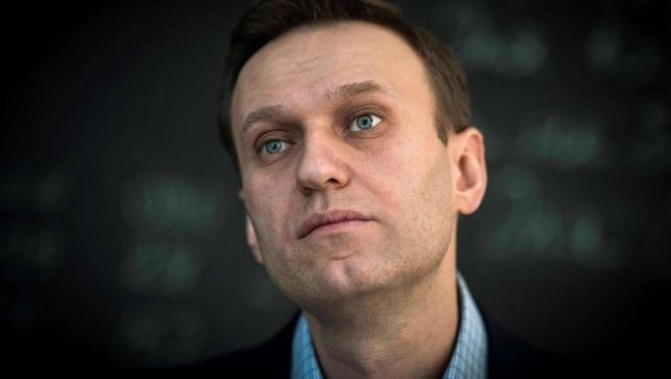
Russia's leading Kremlin critic, Alexey Navalny, was detained by police in Moscow on Sunday, moments after his return to the country and five months after he was poisoned with the nerve agent Novichok.
Navalny was taken away by police officers without explanation, his spokesperson Kira Yarmysh tweeted. His lawyer, who had also flown in from Berlin, was not allowed to accompany the opposition leader, she said.
Live footage from Russian broadcaster TV Rain showed him talking with dark-uniformed and masked officers at Moscow's Sheremetyevo airport, then kissing his wife Yulia before walking away with them.
The couple were returning from a five-month stay in Germany, where he had been recovering from the Novichok poisoning. They landed at Sheremetyevo just after 8 p.m. local time, according to flight data information.
"This is the best day in the past five months," Navalny told journalists at the airport just before his arrest.
"Everyone is asking me if I'm scared. I am not afraid," he said. "I feel completely fine walking towards the border control. I know that I will leave and go home because I'm right and all the criminal cases against me are fabricated."
Navalny was placed on the country's federal wanted list last month for violating terms of probation related to a years-old fraud case, which he dismisses as politically motivated. A statement on Sunday from the Federal Penitentiary Service confirmed Navalny had been detained, and said he would remain in custody until a court hearing later this month, according to TASS.
Navalny has been a perennial thorn in Russian President Vladimir Putin's side, raising concerns for his safety in the country.
After his poisoning with military-grade Novichok in August, a joint investigation by CNN and the group Bellingcat implicated the Russian Security Service (FSB) in the poisoning, piecing together how an elite unit at the agency followed Navalny's team throughout a trip to Siberia, where Navalny was poisoned and fell ill on a flight to Moscow.
The investigation also found that this unit, which included chemical weapons experts, had followed Navalny on more than 30 trips to and from Moscow since 2017. Russia denies involvement in Navalny's poisoning. Putin himself said in December that if Russian security services had wanted to kill Navalny, they "would have finished" the job.
Nevertheless, several Western officials and Navalny himself have openly blamed the Kremlin.
Flight diverted to Sheremetyevo
Navalny had originally been scheduled to land at Vnukovo airport on Sunday, where a crowd of hundreds of supporters and journalists waited to greet him. The flight appeared to be diverted at the last minute to Sheremetyevo. CNN has been unable to establish the reason why.
Russian media broadcasts showed police arresting several allies waiting at Vnukovo amid temperatures of around -20 degrees Celsius (-4 degrees F), including politician and lawyer Lyubov Sobol and Ruslan Shaveddinov, who works for Navalny's Anti-Corruption Foundation.
Before his flight on Russian carrier Pobeda took off from Berlin on Sunday, Navalny thanked the other passengers. "Thanks to you all, I hope we will get there fine," he said according to a live feed from TV Rain. "And I'm sure everything will be absolutely great."
He also thanked Germany for hosting him in an Instagram post on Saturday, praising its citizens as "nice, sympathetic, friendly people."
Several European leaders reacted quickly to news of Navalny's detention.
"The detainment of Alexey Navalny upon arrival in Moscow is unacceptable. I call on Russian authorities to immediately release him," tweeted Charles Michel, President of the European Council.
The Austrian Ministry of Affairs tweeted that it was "deeply concerned" about Navalny's detention, adding: "A vibrant civil society and political opposition are cornerstones of all democratic societies. Austria calls for his immediate release and a full & independent investigation into the attack on his life."
Lithuanian President Gitnas Nauseda, described the arrest as "another evidence of Kremlin's efforts to systematically abuse human rights and democratic freedoms."
And Latvia's Prime Minister Krišjānis Kariņš also called for his release, writing that "in a democratic society, political differences are settled in discussions, not by force or repression."
What's next for Navalny?
Navalny and his Anti-Corruption Foundation have been the subjects of a number of legal cases, which he and allies believe are politically motivated.
In 2014, Navalny was found guilty of fraud after he and his brother Oleg were accused of embezzling 30 million rubles ($540,000) from a Russian subsidiary of French cosmetics company Yves Rocher. While Navalny was given a suspended sentence, his brother was jailed.
The FSIN now accuses Navalny of violating the terms of his probation by failing to show up for scheduled inspections while in Germany. It has requested that a court replace his suspended sentence with a real prison term.
A hearing has been scheduled for January 29. If the FSIN request is granted, Navalny will likely be jailed for 3.5 years.
If Navalny is not convicted later in January, he will still face an investigation for a newer fraud case, in which he and his Anti-Corruption Foundation have been accused of misusing donations from supporters.
"The situation with Navalny looks like two trains running towards each other at full speed, bound to collide," said Tatyana Stanovaya, a visiting fellow, also at the Carnegie Moscow Center. "There will be many victims."
Attacks on Navalny's allies have indeed continued. Pavel Zelensky, a cameraman with Navalny's Anti-Corruption Foundation, was arrested Friday and will be detained until the end of February.
According to Agora, a Russian human rights organization, Zelensky was accused of extremism for tweets from September, in which he blamed the government for journalist Irina Slavina's self-immolation. Before taking her own life, Slavina blamed pressure from Russian law enforcement for her decision to self-immolate.
text by CNN
Take your Radio, Podcasts and Music with you









